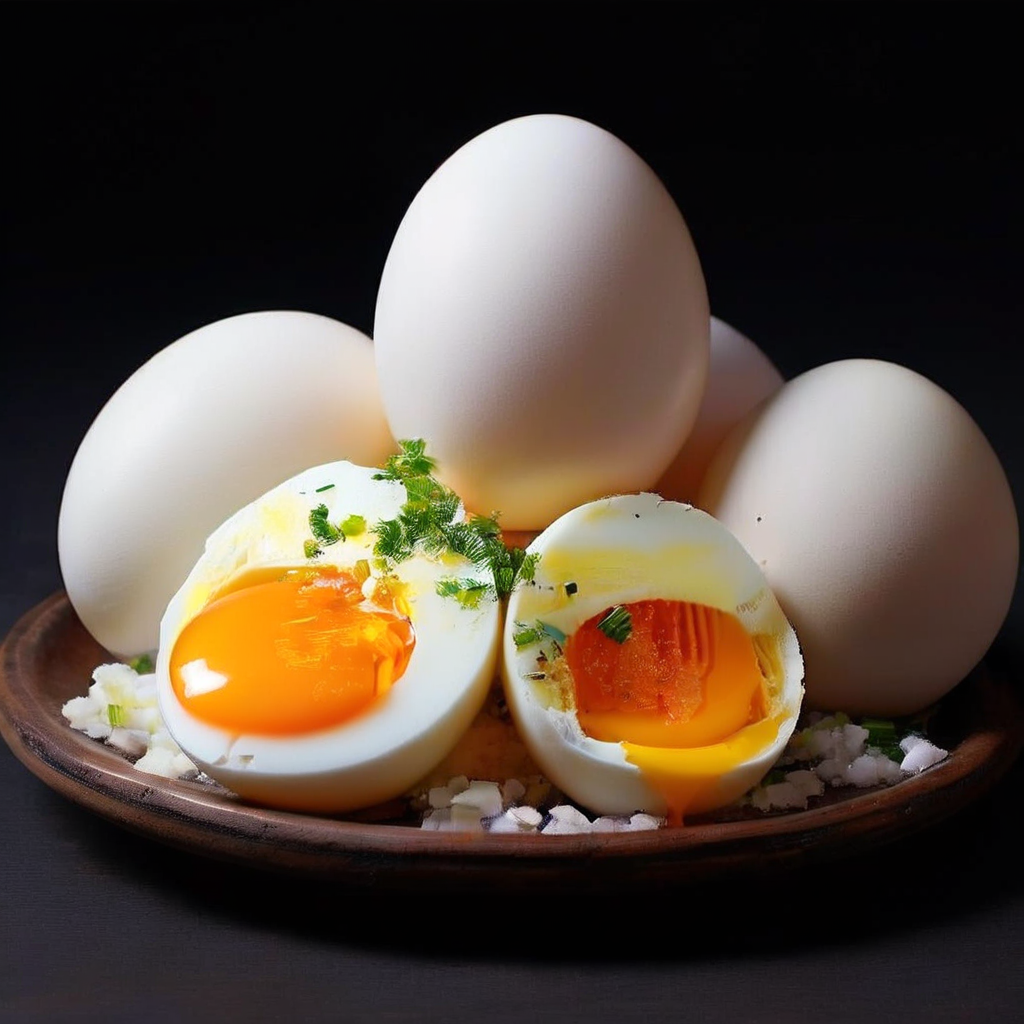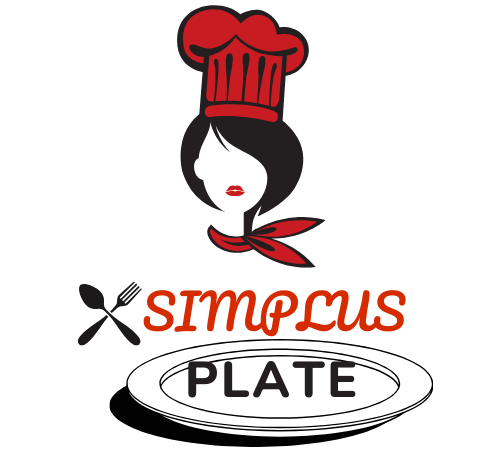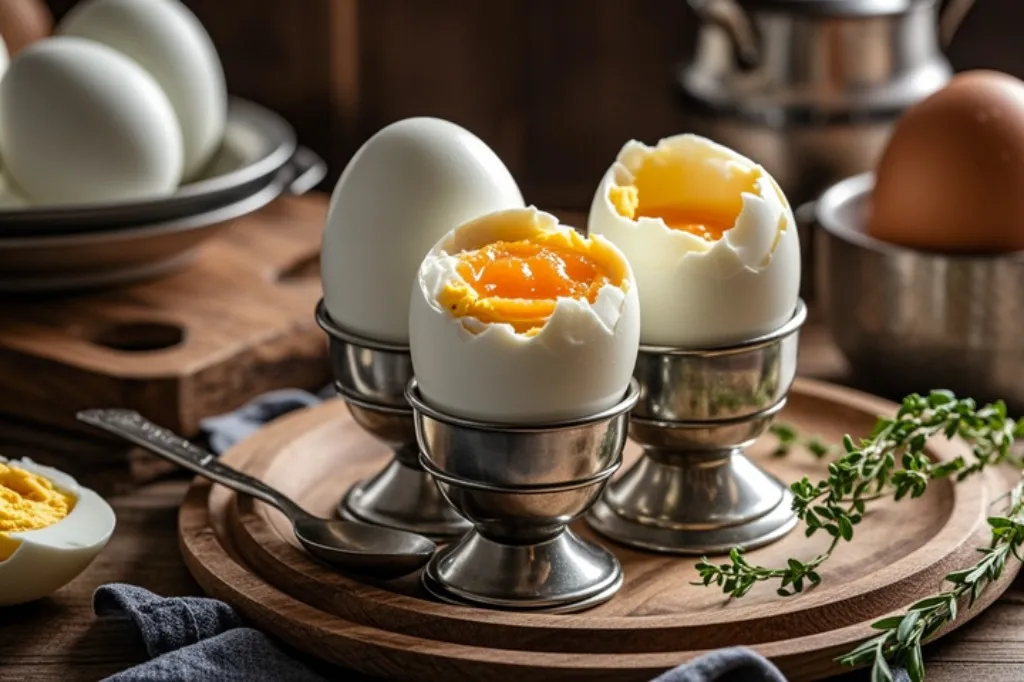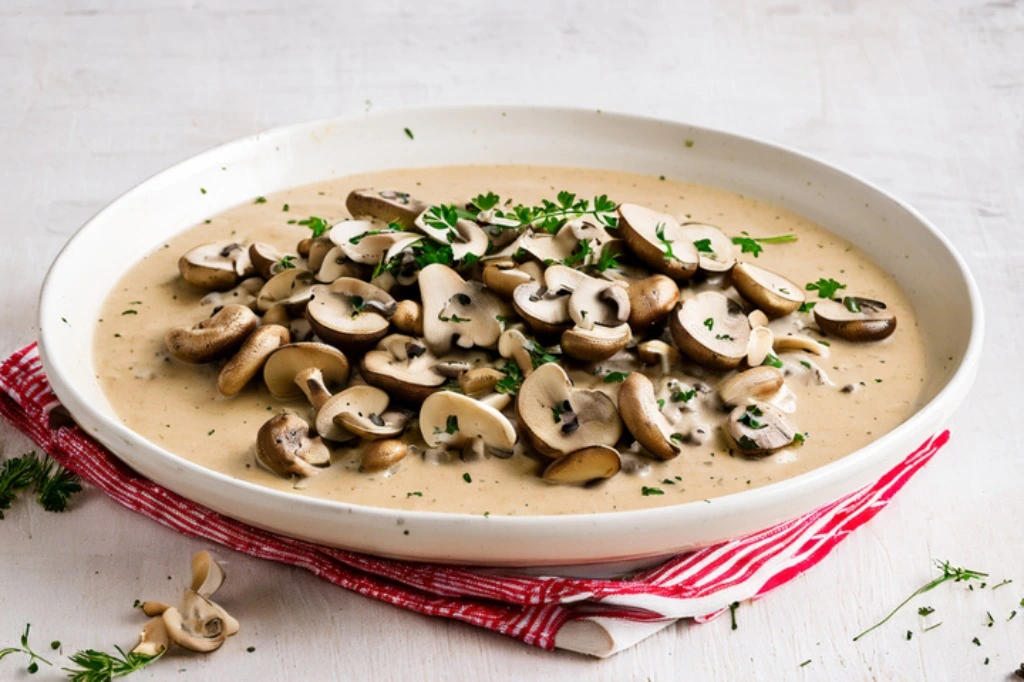
SectionContent1. IntroductionWhat Makes Hard Boiled Eggs So Special?There’s something undeniably satisfying about the simplicity of a hard boiled egg. Maybe it’s the way the shell cracks open with just the right amount of pressure, or the golden yolk that holds a soft, creamy center. Hard boiled eggs are more than just a breakfast staple—they’re a culinary canvas, offering endless possibilities. Whether you’re tossing them into a salad, slicing them onto toast, or enjoying them with a sprinkle of salt, hard boiled eggs are a timeless delight that brings a touch of comfort and nostalgia to the table.2. The Perfect Hard Boiled Egg: A Timeless DebateWhy Perfection Matters in CookingPerfection in cooking isn’t just about impressing others—it’s about the satisfaction that comes from getting it just right. When it comes to hard boiled eggs, there’s a fine line between perfection and disaster. Too soft, and you’re left with a runny mess. Too hard, and you’ve got a rubbery yolk that’s anything but appealing. Achieving the perfect hard boiled egg is a skill that demands attention to detail and respect for the ingredients. After all, it’s the small things that often leave the biggest impression.3. The Science Behind Hard Boiled EggsHow Heat Transforms the EggThe humble egg is a marvel of nature, and understanding how it reacts to heat is key to mastering the hard boiled egg. As the egg heats up, the proteins in the egg whites and yolk begin to denature and coagulate, turning from a liquid to a solid state. The temperature at which this occurs is crucial—too high, and the proteins tighten too much, resulting in a rubbery texture; too low, and the egg remains undercooked. This delicate balance of heat is what transforms the egg from raw to boiled perfection.4. The Art of Boiling an EggChoosing the Right EggThe journey to the perfect hard boiled egg starts with the egg itself. Freshness matters—a fresh egg will be harder to peel, but the taste is unparalleled. On the other hand, an older egg, while easier to peel, may not have the same depth of flavor. Finding the right balance between freshness and ease of peeling is the first step in mastering the art of boiling an egg.
The Ideal Water Temperature
Boiling an egg might seem like the simplest of tasks, but the temperature of the water plays a critical role. Starting with cold water allows the egg to cook more evenly, reducing the risk of cracking. Bringing the water to a gentle boil, rather than a rapid one, ensures that the egg cooks through without becoming tough or rubbery.
Timing is EverythingTiming is the final piece of the puzzle. For a soft yolk, 7 to 8 minutes is ideal; for a fully set yolk, 9 to 12 minutes is the sweet spot. Anything beyond that, and you risk overcooking, leading to the dreaded greenish ring around the yolk—an indicator that the egg has been boiled for too long. A timer is your best friend in this process, helping you achieve consistency every time.5. The Many Uses of Hard Boiled EggsA Versatile IngredientHard boiled eggs are incredibly versatile, making them a staple in kitchens around the world. From quick snacks to gourmet dishes, their uses are nearly endless.
Breakfast Staples
One of the most common uses of hard boiled eggs is as a quick and nutritious breakfast option. Paired with toast, avocados, or even a sprinkle of spices, they make for a hearty start to the day.
Salads and SandwichesHard boiled eggs add a rich texture and flavor to salads and sandwiches. Whether you’re crafting a classic Cobb salad or a simple egg salad sandwich, the hard boiled egg provides a satisfying bite that elevates the dish.6. Health Benefits of Hard Boiled EggsHigh Protein ContentEggs are a powerhouse of protein, with each hard boiled egg offering about 6 grams. This makes them an excellent option for those looking to increase their protein intake without resorting to meat. Protein is essential for muscle repair and growth, making hard boiled eggs a great post-workout snack.
Packed with Vitamins and Minerals
Beyond protein, hard boiled eggs are loaded with essential vitamins and minerals, including Vitamin B12, Vitamin D, and Selenium. These nutrients play a crucial role in everything from brain function to bone health.
The Role in Weight ManagementFor those trying to manage their weight, hard boiled eggs are a dream food. They are low in calories yet high in nutrients, making them filling without contributing to weight gain. The combination of protein and fat in eggs can also help curb hunger, reducing the likelihood of overeating later in the day.7. Common Mistakes When Boiling EggsOvercookingOvercooking is one of the most common mistakes when it comes to hard boiled eggs. Not only does it affect the texture, but it can also alter the taste, making the egg less enjoyable. To avoid this, always stick to the recommended cooking times and use a timer.
The Greenish Hue
If you’ve ever peeled a hard boiled egg only to find a greenish ring around the yolk, you’ve encountered the result of overcooking. This occurs when the egg is boiled for too long, causing the sulfur in the egg whites to react with the iron in the yolk. While harmless, it can be off-putting and is a sign that the egg wasn’t boiled properly.
Peeling ProblemsNothing is more frustrating than trying to peel a hard boiled egg only to have chunks of the white come off with the shell. This is often due to the egg being too fresh or not being cooled properly after boiling. To make peeling easier, always cool the eggs in ice water immediately after boiling.8. How to Peel Hard Boiled Eggs EffortlesslyThe Cold Water Trick
Peeling hard boiled eggs can be a daunting task, but it doesn’t have to be. One of the easiest ways to ensure a smooth peel is by cooling the eggs in cold water immediately after boiling. This helps to contract the egg away from the shell, making it easier to remove without damaging the white.
The Rolling TechniqueAnother tried-and-true method is the rolling technique. After cooling, gently roll the egg on a flat surface, applying just enough pressure to crack the shell. Once the shell is cracked, it should peel away effortlessly, leaving the egg intact and smooth.9. Hard Boiled Eggs in Culinary Traditions Around the WorldThe British Love Affair with Egg MayoIn Britain, the humble hard boiled egg has found a place in one of the nation’s most beloved sandwich fillings—egg mayo. This creamy, tangy spread made with chopped hard boiled eggs, mayonnaise, and a hint of mustard is a staple in British lunchtime culture. It’s a comfort food that’s both simple and satisfying, often paired with cress or lettuce for an added crunch.
Japanese Ramen Eggs
Japan has elevated the hard boiled egg to an art form with its ramen eggs, or ajitsuke tamago. These soft-boiled eggs are marinated in a savory mixture of soy sauce, mirin, and sake, giving the yolk a rich, custard-like texture and a deep umami flavor. They’re the perfect topping for a steaming bowl of ramen, adding both flavor and texture to the dish.
Easter Eggs in European TraditionsIn many European countries, hard boiled eggs are synonymous with Easter celebrations. They are often dyed in vibrant colors and used in various Easter games and traditions, such as egg rolling or egg tapping. These eggs symbolize new life and rebirth, making them a central element in the festive season.10. How Long Do Hard Boiled Eggs Last?Storage Tips
Proper storage is key to extending the shelf life of hard boiled eggs. Once boiled, eggs should be cooled and stored in the refrigerator within two hours to prevent bacterial growth. They can be kept in their shells or peeled, but keeping them in an airtight container is essential to avoid absorbing odors from other foods.
When to Toss Them OutHard boiled eggs generally last about a week in the fridge. However, if they develop an off smell or appear slimy, it’s best to discard them. Peeling the eggs before storing can shorten their shelf life slightly, so it’s often better to leave them in their shells until you’re ready to eat them.11. Creative Recipes Featuring Hard Boiled EggsDeviled Eggs with a TwistDeviled eggs are a classic party appetizer, but with a little creativity, they can be transformed into something extraordinary. Try adding avocado for a creamy texture, or sriracha for a spicy kick. You can also experiment with different toppings, such as crispy bacon, pickled jalapeños, or smoked salmon, to create a dish that’s uniquely yours.
Scotch Eggs
Scotch eggs are a British delicacy that combines the simplicity of a hard boiled egg with the indulgence of sausage and breadcrumbs. The egg is wrapped in seasoned sausage meat, coated in breadcrumbs, and then deep-fried or baked until golden. The result is a deliciously crispy exterior with a perfectly cooked egg inside—ideal for picnics or a hearty snack.
Egg Salad InnovationsEgg salad doesn’t have to be boring. Jazz it up by adding ingredients like fresh herbs, capers, or even curry powder. Serve it on crusty bread, in a wrap, or on top of mixed greens for a light and satisfying meal. The possibilities are endless, making egg salad a versatile and crowd-pleasing dish.12. Hard Boiled Eggs for KidsFun Shapes and Colors
Getting kids to eat healthy can be a challenge, but hard boiled eggs can be made fun with a little creativity. Use egg molds to shape them into stars, hearts, or even animals. You can also dye the eggs using natural food colorings like beet juice or turmeric to make them more appealing to little ones.
Nutritious and Convenient SnacksHard boiled eggs are a perfect snack for kids—portable, easy to eat, and packed with protein. They’re also a great addition to lunchboxes, providing a nutritious option that will keep kids full and focused throughout the day. Pair them with some veggies or whole-grain crackers for a balanced snack that’s both tasty and healthy.13. The Ethical Debate: Free-Range vs. Factory-Farmed EggsWhy Egg Sourcing Matters
In recent years, there has been a growing awareness of where our food comes from, and eggs are no exception. Free-range eggs, produced by hens that have access to the outdoors, are often seen as a more ethical choice compared to factory-farmed eggs. Consumers are increasingly concerned about the conditions in which hens are kept, and this has led to a rise in demand for eggs that are sourced from more humane farming practices.
Impact on Flavor and NutritionThere’s also a debate about whether free-range eggs taste better or are more nutritious than their factory-farmed counterparts. Some argue that free-range eggs have a richer flavor and brighter yolk, while others believe the nutritional differences are minimal. However, choosing free-range eggs can be seen as supporting better animal welfare, which is an important factor for many consumers.14. Debunking Myths About Hard Boiled EggsCholesterol Concerns
For years, eggs were vilified for their cholesterol content, with many believing that eating them could lead to heart disease. However, recent studies have shown that dietary cholesterol has a minimal impact on blood cholesterol levels for most people. In fact, eggs are now considered a healthy part of a balanced diet, offering a range of nutrients that are essential for overall health.
Are Brown Eggs Healthier?Another common myth is that brown eggs are healthier than white eggs. The truth is, the color of the eggshell has nothing to do with the egg’s nutritional value. Brown eggs come from hens with red feathers, while white eggs come from hens with white feathers. Both types of eggs offer the same nutritional benefits, so the choice ultimately comes down to personal preference.15. ConclusionThe Timeless Appeal of Hard Boiled EggsIn the world of food, few things are as universally loved and versatile as the hard boiled egg. From breakfast to dinner, and from simple snacks to gourmet dishes, hard boiled eggs offer something for everyone. They’re a nutritional powerhouse, a culinary staple, and a source of comfort and tradition. Whether you’re perfecting your boiling technique, exploring new recipes, or simply enjoying them as they are, hard boiled eggs are a timeless classic that will never go out of style.
FAQs
-
How can I prevent my hard boiled eggs from cracking while cooking? To prevent eggs from cracking, start with cold water and gradually bring it to a boil. Adding a pinch of salt or vinegar to the water can also help to strengthen the eggshells.
-
Why are my hard boiled eggs difficult to peel? Fresh eggs are harder to peel because the albumen (egg white) sticks more to the inner shell. Using slightly older eggs or cooling them in ice water immediately after boiling can make peeling easier.
-
Can I freeze hard boiled eggs? While you can freeze hard boiled eggs, it’s not recommended as the whites can become rubbery and watery. If you need to freeze eggs, it’s better to freeze them raw or only freeze the yolks.
-
How can I tell if a hard boiled egg has gone bad? A bad egg will usually have an unpleasant odor or slimy texture. If you’re unsure, you can also perform a float test—if the egg floats in water, it’s likely spoiled.
-
Is there a difference in taste between brown and white eggs? No, there is no difference in taste between brown and white eggs. The color of the eggshell is simply due to the breed of the hen and does not affect the flavor or nutritional content.









Leave a Reply